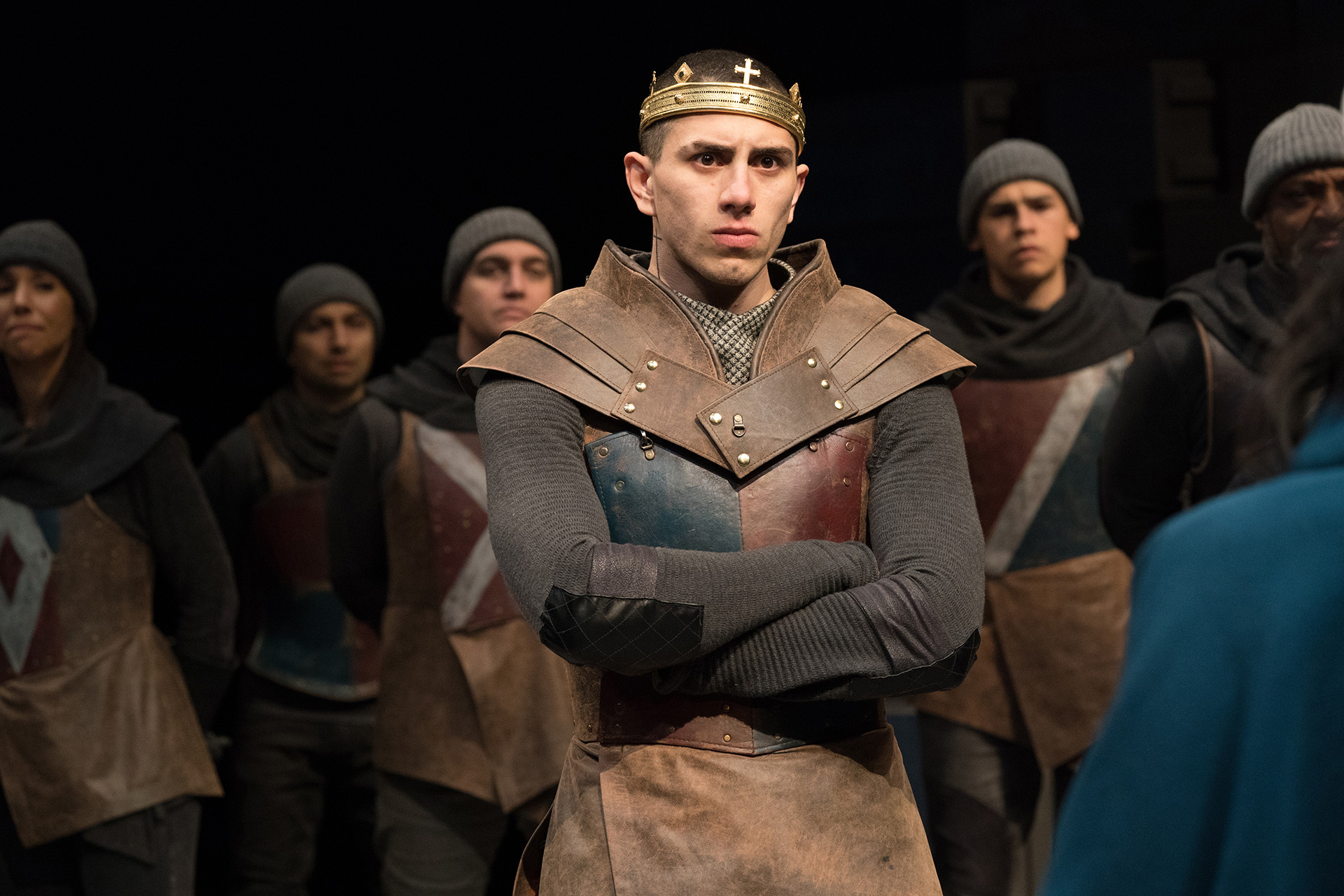 |
| OSF photo by Jenny Graham |
Day one of the trip is a Shakespeare double header: Henry V in the afternoon, followed by Romeo and Juliet in the evening. I was excited to see this Henry V, partly because it's just a tremendous play, full of wonderful language and great drama. But also because it represents the culmination of a three-year, four-play journey that began with a wonderful Richard II in 2016, followed by both parts of Henry IV last summer.
The Play
I don't really have to go into why this is such a great play. At the end of Henry IV, Prince Hal has ascended to the throne to become King Henry V, along the way symbolically dismissing his playboy past along with his companion, Falstaff. Now in Henry V, we see the new king settling into his position, ready to claim the throne of France as well.Here we get to see the newly-serious king grappling with literal issues of life and death, war and peace. And we see him stepping into the role his father established before him, trying to unite the competing factions that divided England in civil war in the earlier plays.
Henry V is just an outstanding story for both the historical aspects and the stirring, patriotic overtones. There is no question why Olivier made a film of it during World War II, and Kenneth Brannagh made a version in the 80s. It's easy to get excited about England as we watch the charismatic king lead his troops to victory against tremendous odds.
There is good reason this is the best known and best loved of Shakespeare's history plays.
The Production
Always at the forefront of Henry V is the actor playing the eponymous king. Here, Daniel Jose Molina continues the role he began as Hal in the Henry IV plays last season. And that alone is reason enough to see this show. Molina impressed me immeasurably when he made his debut at OSF several years ago as Romeo, and has continued to blow me away, including his role as Elliot in Water By the Spoonful a couple of years back. Above all, he has impressed me with the thoughtful way he expresses Shakespeare's language, making it sound as if he's genuinely thinking and speaking, rather than reciting. It's quite remarkable and rare, and a treat to hear.I should also mention that one of the strengths of this production is that it's once again presented in the close confines of the Thomas Theatre, OSF's small, black-box space. Even more than with the preceding plays in the series, Henry V benefits from the close exposure. At the same time, it makes it impossible to put throngs of actors in service of recreating giant battles, so director Rosa Joshi has carefully set it up so each combat and each death serves as a synecdoche, such as when the unnamed Boy (formerly Falstaff's page) is killed, representing the massacre of all the boys by the French.
Some of the techniques used to evidence the scope of the bloodshed are a little heavy-handed, but overall the approach is excellent.
Similarly, because of the small cast, the ensemble sometimes has to switch quickly from being the French army to the English, and designer Sarah Ryung Clement's costumes switch brilliantly back and forth.
Finally, my Welsh grandmother wouldn't forgive me if I didn't call out Rex Young's excellent portrayal of Captain Fluellen and his masterful besting of his English counterpart, Gower, complete with a very large leek. Again, this is enough to justify seeing the entire production.
Bottom Line
A lot of history passes between the start of Richard II and the end of Henry V, and despite being designed and directed by different crews, the continuity of key actors really helped with the flow. I'm slightly disappointed that Ashland isn't carrying on with Henry VI next season, because I'm ready for more history now, but I also realize that this is a pretty good place to break the progression, and the Henry VI plays aren't nearly as popular as the others.Still, I have to applaud the overall three-year effort to present the "Henriad" with such a degree of continuity. Although I didn't always care for the particular styles of the productions (particularly with some of Henry IV), I thought the acting and direction were excellent, and the larger story lines easy to follow. That's no small feat with Shakespeare's histories. The last time I'd seen the Henriad was in the outdoor Elizabethan theater, which has its own sort of majesty. This setting makes for much more personal interpretations of the characters and the plays.
So, all in all, a wonderful and satisfying conclusion to this odyssey. It's a good sign when seeing that many plays makes you want to see some more!
No comments:
Post a Comment